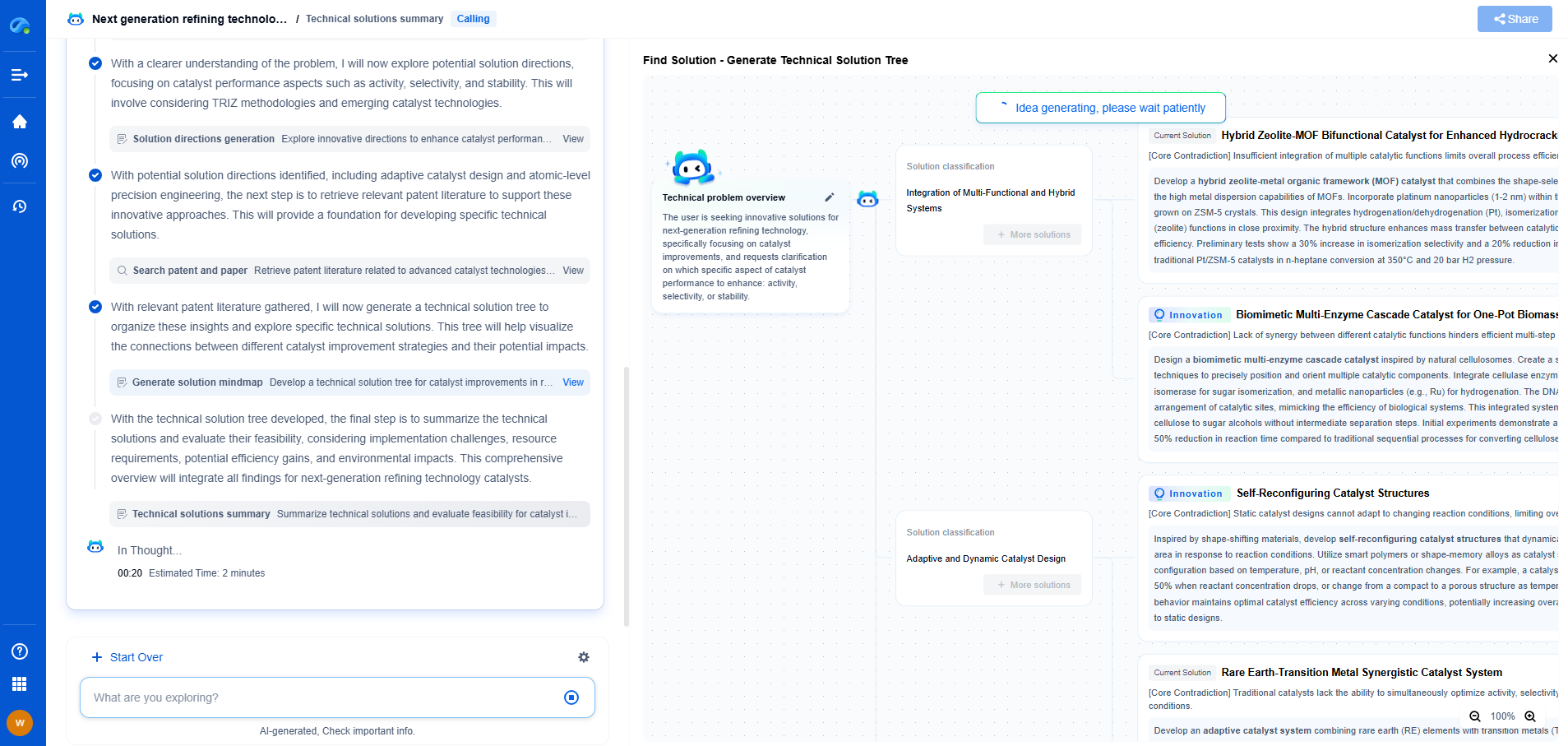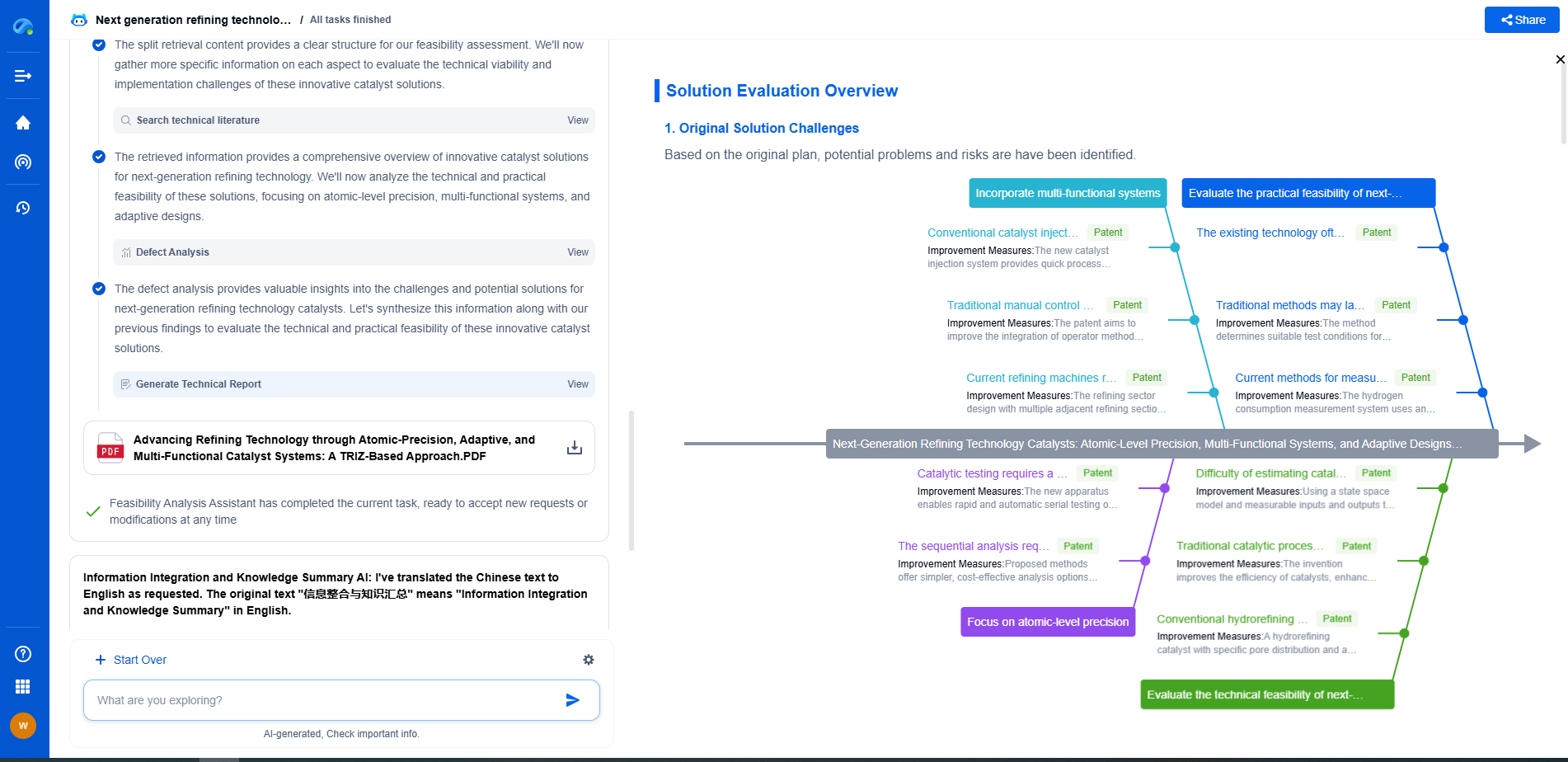How smart completions are enabling production optimization
JUN 20, 2025 |
Understanding Smart Completions
Smart completions refer to advanced technological systems integrated into oil and gas wells to enhance production management and optimization. These systems combine hardware and software solutions that allow operators to monitor, control, and adjust production parameters in real-time. By leveraging automation and data analytics, smart completions enable operators to make informed decisions to maximize efficiency and reduce operational costs.
Key Components of Smart Completions
Smart completions typically consist of several essential components, including downhole sensors, remote monitoring systems, and advanced data analytics platforms. Downhole sensors gather valuable information from the well, such as pressure, temperature, flow rate, and other critical metrics. This data is transmitted to remote monitoring systems, where it is analyzed using sophisticated algorithms to provide actionable insights. Operators can then adjust production parameters remotely, ensuring optimal performance without the need for manual interventions.
Benefits of Smart Completions
1. Enhanced Production Efficiency: One of the primary advantages of smart completions is improved production efficiency. By continuously monitoring well conditions, operators can optimize production rates, reduce downtime, and enhance resource utilization. This leads to increased output and profitability for oil and gas companies.
2. Cost Reduction: Smart completions contribute to cost reduction by minimizing the need for manual interventions and reducing operational inefficiencies. Automated systems are capable of detecting issues early, preventing costly downtime and repairs. Additionally, optimized production processes result in reduced resource consumption, further lowering operational costs.
3. Improved Reservoir Management: Smart completions provide valuable insights into reservoir behavior, allowing operators to manage reservoirs more effectively. By understanding how reservoirs respond to different production strategies, companies can tailor their approach to maximize recovery and extend the lifespan of the reservoir.
Real-World Applications
Smart completions have demonstrated their effectiveness in various real-world scenarios. For instance, in mature fields, where production rates often decline over time, smart completions have been used to rejuvenate wells and boost output. By monitoring well conditions and adjusting production strategies based on real-time data, operators have successfully increased recovery rates and prolonged the life of these fields.
Additionally, smart completions are proving invaluable in complex environments such as deepwater and unconventional reservoirs. In these challenging conditions, traditional methods may be insufficient to optimize production. Smart completions provide the necessary tools to monitor and control well performance, ensuring efficiency even in the most demanding settings.
Challenges and Future Prospects
Despite their numerous advantages, smart completions are not without challenges. Implementing these systems requires significant investment in technology and infrastructure, which can be a barrier for smaller companies. Additionally, integrating smart completion solutions into existing operations may require substantial changes to workflows and processes, necessitating training and adaptation.
Looking to the future, the continued advancement of smart completion technologies promises even greater potential for production optimization. As artificial intelligence and machine learning capabilities improve, smart completions will become increasingly adept at predicting and responding to well conditions. This will further enhance efficiency, reduce costs, and enable more sustainable production practices across the industry.
Conclusion
Smart completions are a game-changer for the oil and gas industry, offering a host of benefits that enable production optimization. By understanding their components, advantages, and real-world applications, operators can leverage these technologies to achieve greater efficiency and profitability. Despite challenges, the future of smart completions holds immense promise, paving the way for more innovative and sustainable production practices. As the industry continues to evolve, smart completions will remain at the forefront of technological advancement, driving progress and success in oil and gas exploration and production.
Navigating the Complexities of Drilling Innovation? Let AI Do the Heavy Lifting
In an industry where subsurface conditions, materials science, and drilling dynamics evolve rapidly, staying ahead of technical innovation and protecting your intellectual property can be overwhelming.
Patsnap Eureka, our cutting-edge AI assistant, is built for R&D and IP professionals in high-tech industries like drilling technologies. Whether you're optimizing rotary steerable systems, evaluating high-temperature materials, or exploring next-gen automation in directional drilling, Eureka enables real-time analysis of the latest patents, technology landscapes, and competitive movements—all from one intelligent, intuitive platform.
Ready to accelerate your development cycle and make strategic decisions with confidence? Explore Patsnap Eureka today—where smart drilling starts with smarter insights.
- R&D
- Intellectual Property
- Life Sciences
- Materials
- Tech Scout
- Unparalleled Data Quality
- Higher Quality Content
- 60% Fewer Hallucinations
Browse by: Latest US Patents, China's latest patents, Technical Efficacy Thesaurus, Application Domain, Technology Topic, Popular Technical Reports.
© 2025 PatSnap. All rights reserved.Legal|Privacy policy|Modern Slavery Act Transparency Statement|Sitemap|About US| Contact US: help@patsnap.com

